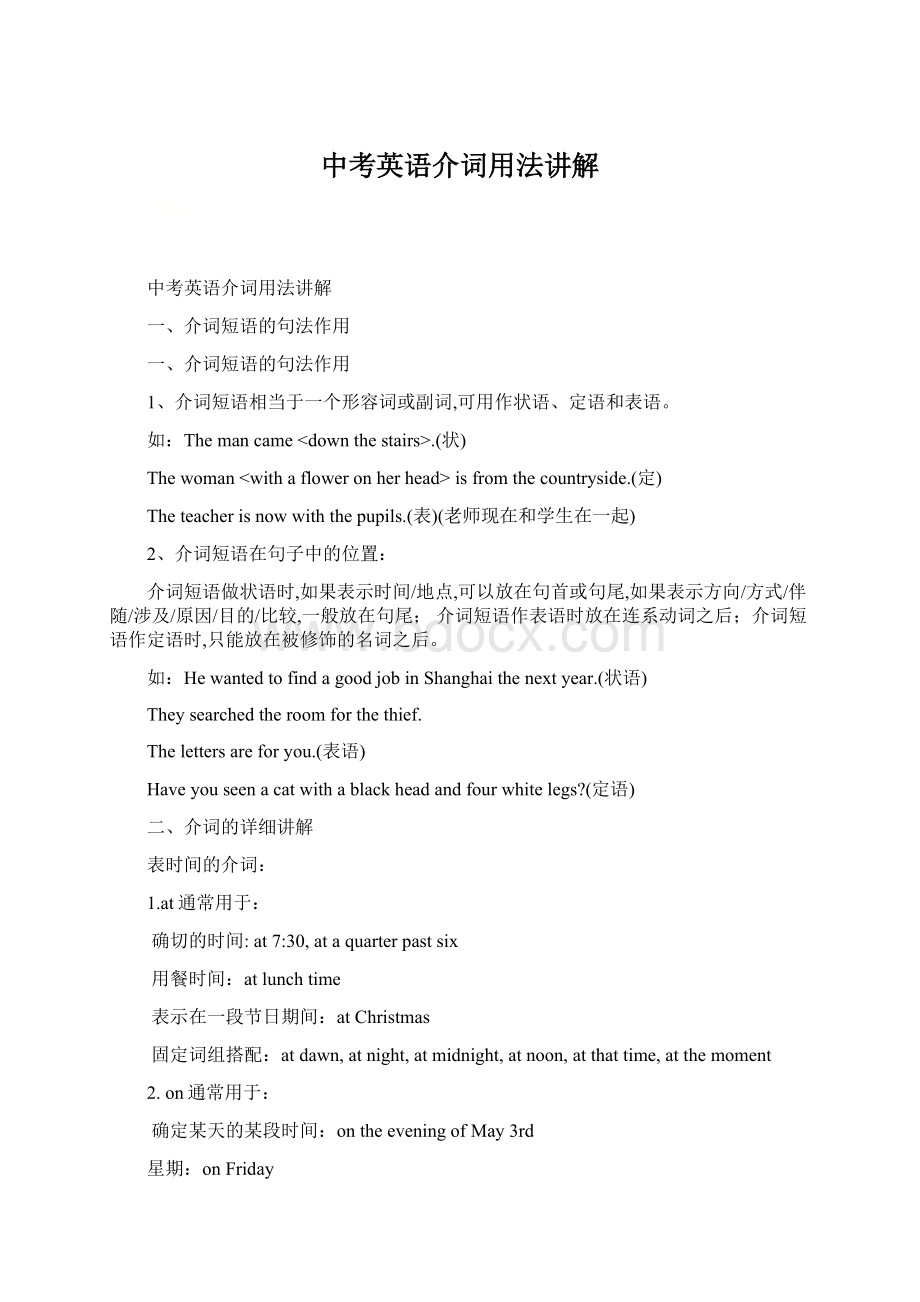中考英语介词用法讲解.docx
《中考英语介词用法讲解.docx》由会员分享,可在线阅读,更多相关《中考英语介词用法讲解.docx(11页珍藏版)》请在冰豆网上搜索。

中考英语介词用法讲解
中考英语介词用法讲解
一、介词短语的句法作用
一、介词短语的句法作用
1、介词短语相当于一个形容词或副词,可用作状语、定语和表语。
如:
Themancame.(状)
Thewomanisfromthecountryside.(定)
Theteacherisnowwiththepupils.(表)(老师现在和学生在一起)
2、介词短语在句子中的位置:
介词短语做状语时,如果表示时间/地点,可以放在句首或句尾,如果表示方向/方式/伴随/涉及/原因/目的/比较,一般放在句尾;介词短语作表语时放在连系动词之后;介词短语作定语时,只能放在被修饰的名词之后。
如:
HewantedtofindagoodjobinShanghaithenextyear.(状语)
Theysearchedtheroomforthethief.
Thelettersareforyou.(表语)
Haveyouseenacatwithablackheadandfourwhitelegs?
(定语)
二、介词的详细讲解
表时间的介词:
1.at通常用于:
确切的时间:
at7:
30,ataquarterpastsix
用餐时间:
atlunchtime
表示在一段节日期间:
atChristmas
固定词组搭配:
atdawn,atnight,atmidnight,atnoon,atthattime,atthemoment
2.on通常用于:
确定某天的某段时间:
ontheeveningofMay3rd
星期:
onFriday
确切日期:
onJunelst
节日当天:
onChildren'sDay,onNewYear'sDay
文学类的天气描述:
onadarkevening,onasnowyday
3.in通常用于:
一天中的某段时间:
inthemorning/afternoon/evening
大概的月份、年份:
inJune,in2004
季节:
inspring,inthecoldwinter
世纪:
inthe20thcentury,inthelate18thcentury
特定的年龄段,inhisthirties(在他30多岁时)
【友情提示】“in十一段时间”用于将来时。
e.g.Hewillcomebackinanhour.他一小时后会回来。
“after+一段时间”用于过去时
4.在以next,last,this引起的时间状语及tomorrow,tonight,yesterday,thedayaftertomorrow,...ago等时间状语前及指示代词,名词所有格及形容词性物主代词前一般不加介词。
5.for和since
用于现在完成时,用howlong来提问:
for+时间段
since+时间段+ago
since+时间点
since+一般过去时句子
如:
UncleLihasworkedinthisfactorysince1970.
UncleLihasworkedinthisfactoryforover30years.
6.其他常见的时间介词
after在…以后after3days
before在…以前3daysbefore
past过了…(时)20past8(8点20分)
to到(下一时刻)20to8(7点40)
through贯穿…(期间)throughtheyear
from从…(时)起
by到…为止,till直到…时,until直到…时,
eversince从那时起至今
表地点的介词
over(正上方)、above(上方的一片)、on(接触的平面)
under(正下方)、below(下方的一片)
at+小地方(场所如学校、医院、剧场等)
in+大地方(州、区域、国家、城镇、)
on+门牌,某层楼
across在…对面(goacross从平面穿过/gothrough从立体的)
through与across、over的用法区别:
through指“穿过…(门洞/人群/树林)”;across和over可以指“跨越…(街道/河流)”,可互换,但是表示“翻过…”时只能用over.
如:
Justthenaratranacrosstheroad.
Thereisabridgeacross/overtheriver.
Theyclimbedoverthemountainandarrivedthereaheadoftime.
Thevisitorswentthroughabiggateintoanotherpark.
among在…中间(三者以上之间)
between在...之间(两者之间,两两相互之间)、
infrontof在...前(外部)inthefrontof在...前(内部)
如:
Acarwasparkinginfrontofthehall
Inthefrontofthehallstoodabigdesk.
closeto靠近...,
表方位的介词
across横越...,against对抗...,along沿着...,around绕着...,
at朝着...,behind向…后面,between…and…从…到...,
by路过/通过...,down向…下,for向...,from从/离...,
in进入...,into进入...,inside到...里面,near接近...,
off脱离/除...,on在...上,outof向...外,outside向....外,
over跨过...,past经过/超过...,through穿过...,to向/朝...,
towards朝着...,onto到...上面,onto到...上面,awayfrom远离...
表方式、手段的介词
as作为/当作...
by用/由/乘坐/被...
in用…(语言),
like与…一样,
on骑(车)/徒(步),通过(收音机/电视机),
through通过...,
with用(材料/工具)、用(手/脚/耳/眼);
without没有…
三.常用介词用法归纳:
介词:
except、besides、exceptfor
except除掉…,不包括….,表示排除掉某人物,即不包含
besides除了…还有,表示包含,即“不仅……又……”
exceptfor美中不足
如:
EveryonewenttothePalaceMuseumexceptTom.)(Tom没有去故宫
BesidesChinesehealsostudiedmanyothersubjects.(“汉语”也是他学的功课之一)
批注:
谐音记忆法:
“包含”和“besides”首字母都有b,有b的(besides)是包含,没b的(except,exceptfor)是不包含。
介词for:
1.为了Idoitforyou.
2.一段时间Ihaven’tseenyouforalongtime
3.对于It’sdifficultforhimtofinishthetask.
4.因为Iamsorryforhismisfortune.
介词to:
1.给Igivethepresenttoyou.
2.对…而言Thepresentisimportanttome
介词with:
1.由于…withpleasure
2.带有thegirlwithlonghair
3.用Icanwritewithapen
4.和….一起Wewillgowithyou
without无,没有
介词in:
1.在…(方面)dowellin
2.在….时候intheevening
3.在….地方inBeijing
介词on:
1.关于/有关..abookonhistory
2.在….时候onFriday
3.在….上onthedesk
介词as:
1.与…一样Youhavethesameinterestasme.
2.as作为/当作...Heworksasawriter.
介词from:
1.来自comefrom
2.从….到(to)…tellAfromBfromdoortodoor
stop/prevent/protectsbfromdoingsth
4、介词有时会与它的宾语分离,而且宾语前置。
1)当宾语是疑问词时。
Whoareyoutalkingabout?
2)宾语在从句中当连接词时。
Hehasayoungerbrotherwhohemusttakegoodcareof.
Doyouknowwhoourteacheristalkingwithoverthere?
3)动词不定式作定语且该动词为不及物动词,后面有介词。
Ifinallyfoundachairtositon.
5、记住一些固定词组:
arriveat/in(到达…),onfoot(步行),not…atall(根本不),
tothenorthof(在…以北),intheeastof(在…的东部),inthenight(在夜间),
atnight(在晚上),beafraidof(害怕…),befullof(充满/装满….),
befilledwith(充满/装满….),begood/badfor(对…有益/有害),bemadeof(由…做成),
bemadefrom(由…制造),playwith(玩耍……),lookoutof(朝…外面看),
attheendof(在…末梢/结束时),bytheendof(不迟于…/到…末为止),
withthehelpof(在…的帮助下),withone’shelp(在…的帮助下),
lookafter(照料…),lookfor(寻找…),
onabike(=bybike)骑车,helpsb.with(帮某人做…),
geton(well)with(与某人相处[融洽]),等等。
三、某些介词的用法辨析
1、by、in与with表示方式的用法区别:
都可以表示“工具、手段”,但是by主要表示“乘坐”某个交通工具或“以……方式”,在被动句中可以表示动作的执行者;in表示“使用”某种语言/文字,with表示“使用”某个具体的工具、手段。
如:
Weseewithoureyesandwalkwithourfeet.
Pleasewritethatarticle(文章)inEnglish.
Let’sgotothezoobytaxi.
ItwaswrittenbyLaoShe.
2、as与like的区别:
两个词都表示“像……”,但是as译为“作为……”,表示的是职业、职务、作用等事实,而like译为“像……一样”,表示外表,不是事实。
批注:
区别不明显,不如举例说明:
Letmespeaktoyouasafather.(说话者是听者的父亲)/Letmespeaktoyoulikeafather.(说话者不是听者的父亲)
3、attheendof、bytheendof、totheend、intheend的用法区别:
attheendof…既可以表示时间也可以表示地点,译为“在…末;在…尽头”,常与过去时连用;
bytheendof…只能表示时间,译为“在…前;到…为止”,常用于过去完成时;
intheend与atlast基本等义,表示“终于、最后”,通常用于过去时;
totheend译为“到…的终点为止”,前面往往有表示运动或连续性的动词。
如:
Bytheendoflasttermwehadlearned16unitsofBookIII.
Attheendoftheroadyoucanfindabigwhitehousewithbrownwindows.
TheyleftforBeijingattheendoflastweek.
Intheendhesucceededinthefinalexams.
Weshouldgoonwiththeworktotheend.
Followthisroadtotheendandyouwillseeapostoffice.
4、but的问题:
用介词but引出另一个动词时,要注意:
如果前面有do,后面就用原形动词,前面没有do时,后面的动词要加to。
如:
Icoulddonothingbutwait.
Theyhadnochoice(选择)buttofight.
强化练习
1.TheweddingofPrinceWilliamandKateMiddletonwasheldinWestminsterCathedral__________April29,2017.
A.inB.onC.atD.by
2.Theyarrivedthereacoldwinterevening.
A.onB.inC.duringD.at
3.Lucythinksyoungpeoplecanlearnhowtocareforothers____keepingpets.
A..atB.onC.inD.by
4.GuoJingming,24,hastoppedthe2011RichListofChineseWriters,whichwaspublished______November21,2011.
A.inB.onC.atD.for
5.Whetherourschoolwillgototheamusementparknextweekdepends_______theweather.
A.aboutB.onC.ofD.in
6.A:
Whendiditbegintosnow?
B:
Itstarted______thenight.
A.duringB.byC.fromD.at
7.Thepostmancriedoutdownstairs,“Mr.Anderson,hereisaletter_____you.”
A.ofB.onC.withD.for
8.Joycewroteanarticle_______howtoimproveourmemoryfortheschoolnewspaper.
A.forB.onC.inD.at
9.JessieiskeenwatchingtheTVshowOneoutof100attheweekend.
A.onB.inC.toD.with
10._______December11,2001,Chinaformallybecamethe143rdmemberoftheWTO
A.inB.OnC.AtD.Until
11.TheYangtzeRiverruns____________themountains,throughthebeautifulThreeGorgesandfinally
intothesea.
A.atB.toC.onD.Down
12.IhearourheadteacherwillbebackfromUSAthreeweeks'time.
A.atB.ofC.inD.with
13.YoucanimproveyourspokenEnglishusingitmoreandmore.
A.inB.atC.byD.from
14.Theworstfireoccurred(发生)inHongKongNovember30,2011.
A.inB.onC.atD.by
15.Jackwasluckytogettwotickets________thatconcert.
A.forB.inC.onD.about
16.MyunclewantstobuyanewhouseasmallgardenbesidetheDianshanLake.
A.atB.ofC.inD.with
17.TheNBAisinalockout(停摆)becauseplayersandownersfailedtoreachanewdealJuly1st.
A.inB.onC.atD.since
18.Itwasnotagoodexplanation,butitsatisfiedEddie____thetimebeing.
A.onB.atC.forD.with
答案:
1—5BADBB6—10CDBAB11—15DBCBA16—18DBC
练习二:
1.---Iamnot_____thiscity.Wouldyoupleaseintroduceittome?
---Withpleasure.
A.familiartoB.familiarinC.familiarforD.familiarwith
2.Thisareaisfamous_____itsapplesanditisfamous_____thehomeofapple.
A.with;forB.for;asC.for;asD.as;to
3.Theplanforanewairporthavebeenscrapped__________anextensiontotheoldone.
A.infavourB.outoffavourC.infavourofD.favourite
4.Theyhurriedaway_____fearthatshouldbecaughtinrain.
A.inB.forC.atD.on
5.Twodogs______abone,andathirdrunsawaywithit.
A.fightbackB.fightwithC.fightagainstD.fightfor
6.Whenthegoodnewscamethatourfootballteamwonthechampionship,thehallwasatonce_______greatjoy.
A.filledofB.fullwithC.filledwithD.fillwith
7.ThePrimeMinisterwasmorefit__________hisofficethananyoneelse.
A.forB.toC.withD.of
8.Whentheboyplayingbytheriverfellintotheriver,Iwasoutoftheroom_______.
A.inrushB.inarushC.asarushD.forarush
9.Withtheguideleadingtheway,thevisitorswereabletotravelthroughtheforestnotbyairbut_____foot.
A.byB.onC.inD.with
10.Iknowitisdifficult__________himtotalklikethelecturer,butIthinkheshouldgraspeverychance.
A.ofB.forC.withD.over
【Keys】1~5DCCBD6~10CABBB
练习三:
介词易错题训练
1.MoreandmorepeopleinShanghaiareabletotalkandwriteEnglishthesedays.(04)
A.forB.withC.inD.to
2.Mum,todayisMother’sDay.MikeandIwanttoinviteyoutohavedinnerusatShanghaiRestaurant,whichisfamous________itsseafood.(03)
A.with,ofB.with,forC.for,toD.to,for
3Wushuisbecomingmoreandmorepopularforeigners.(02)
A.amongB.forC.inD.to
4.Ifyouareabletogettheticketstomorrow,pleaseteJlmephone.(02)
A.atB.byC.onD.through.
5.TheforeignersarrivedShanghai